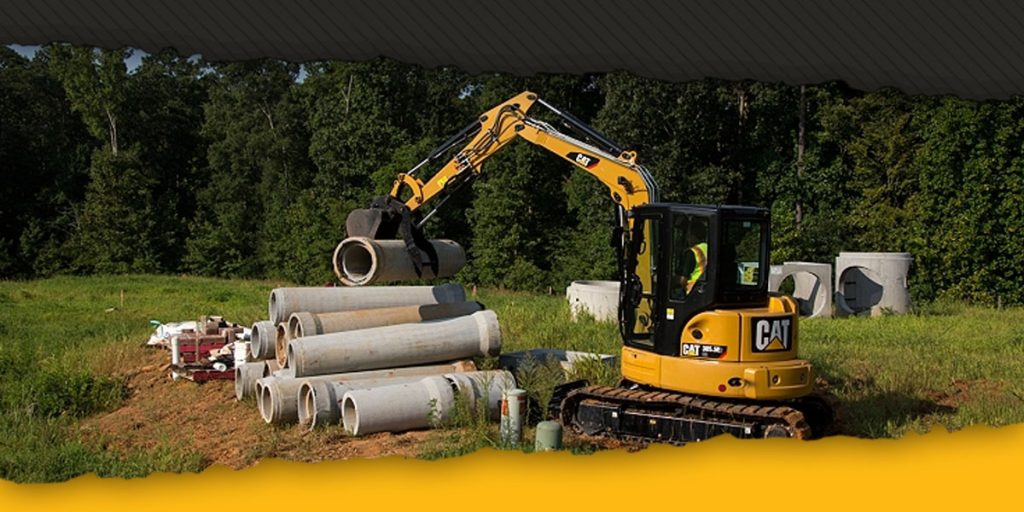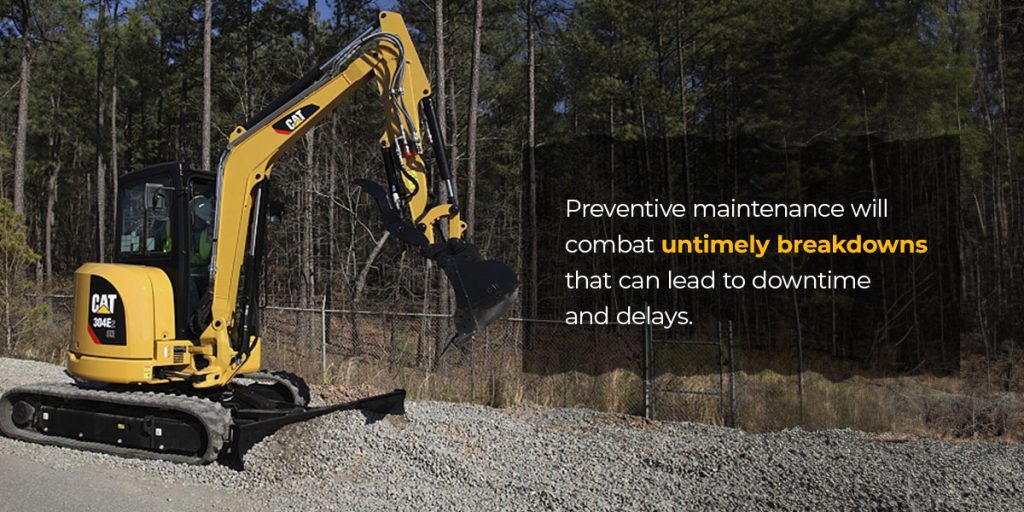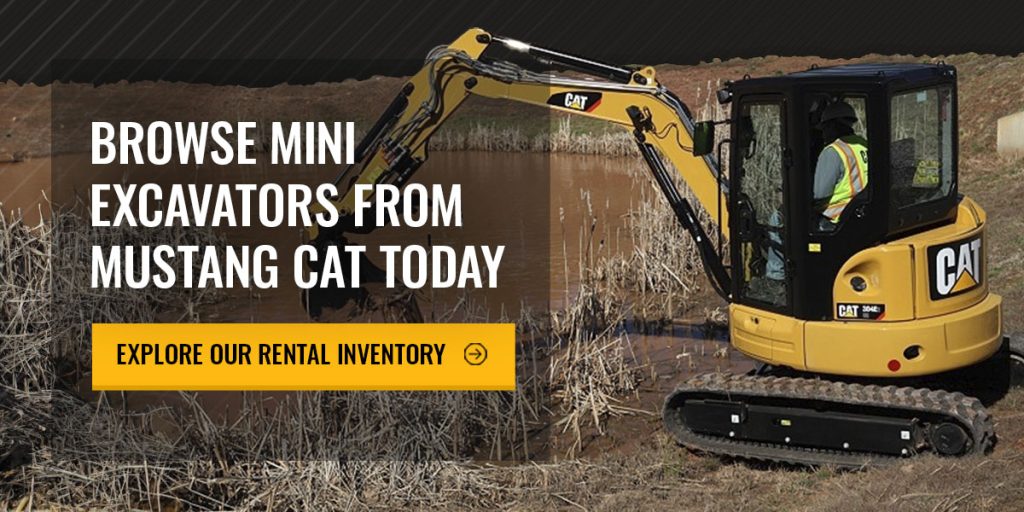Everything You Need to Know About Mini Excavators

Mini excavators, also called mini diggers or compact excavators, are diverse machines that can handle tasks across numerous industries, from construction to agriculture. Before buying or renting one of these machines, you can benefit from understanding their key features and capabilities.
Learn more about mini excavator uses and important considerations for adding one to your equipment lineup.
Key Features and Components of Mini Excavators
Compact excavators are small, lightweight pieces of equipment that typically feature an operator’s cab, boom, stick and bucket attachment. Most models have tracks, though some operate with wheels. Some models also feature a stabilizer blade next to the tracks for enhanced balance during operation. You can find mini excavators with varying horsepower and digging depths.
Key advantages of having a mini excavator include:
- Accessibility: Mini diggers are ideal for applications involving tight spaces. Their small size enables them to access hard-to-reach areas not possible with larger models.
- Maneuverability: Their small size allows these machines to navigate around obstacles and through confined spaces with greater maneuverability and efficiency.
- Versatility: Mini excavators can work with various attachments to diversify their uses and tackle many different tasks.
- Transport: Thanks to their lightweight and compact build, mini excavators are easier to transport to different job sites than larger models.
- Fuel efficiency: These pieces of equipment also feature smaller engines that consume less fuel than their larger counterparts, contributing to long-term cost savings.
- Reduced surface damage: Compact excavators are suitable for delicate ground surfaces because they are lighter than full-size models and minimize soil compaction.
Mini Excavators vs. Small Excavators
You’ll find there are mini and small excavators as you explore different models. While both types are compact and versatile, a small excavator is slightly larger. These models are typically more powerful and have a longer reach for deeper excavation projects. They also have a slightly higher price tag.
Mini excavators are better suited for small-scale projects requiring optimal maneuverability and access to especially tight spaces.
Mini Excavator Applications
Compact excavators are useful for many applications across various industries, including:
- Demolition: These machines can be handy for small-scale demolition work, like breaking up concrete structures or clearing debris from job sites.
- Construction: Mini diggers are often used for construction tasks, like digging foundations or trenches.
- Utility work: Their compact size makes these excavators a go-to piece of equipment for accessing hard-to-reach electrical, water or sewer lines for installation or repairs.
- Roadwork: Mini excavators are often used in roadwork jobs like digging trenches, repairing potholes or laying pipework.
- Landscaping: Many landscaping businesses use compact excavators for general earthmoving tasks and grading or backfilling to establish garden beds or install structures like ponds.
- Farming: The agricultural industry uses mini excavators for material handling and digging tasks on the farm.
Attachments further diversify the uses for mini excavators, and some common examples include:
- Buckets: Buckets are the most common attachment for these machines and are the go-to option for digging and material handling applications.
- Augers: These tools help operators drill holes into the ground for jobs like planting trees or installing fence posts.
- Trenchers: This attachment streamlines digging and creates narrow trenches for irrigation, drainage or utilities.
- Breakers: You can use hydraulic breaker attachments for demolition work, like breaking up asphalt, concrete or rock.
- Grapples: Mini excavators with grapple attachments can grab and move materials such as rocks, logs or debris around a site.
Compact Excavator Maintenance Tips
Proper maintenance is key to getting the most out of your compact excavator investment. Below are helpful tips to ensure your machine is ready when you need it:

- Stick with a preventive maintenance routine: Scheduling routine service with an expert technician will help ensure your mini excavator is in working order and can support optimal productivity and efficiency on the job. Preventive maintenance will combat untimely breakdowns that can lead to downtime and delays.
- Tend to repairs immediately: If you notice your compact excavator is making strange sounds, leaking fluids, overheating or experiencing any other performance issues, have a professional inspect it promptly. If the equipment requires repairs, tend to them right away to avoid creating additional problems.
- Use original equipment manufacturer (OEM) parts: If your mini digger requires a replacement part, always choose OEM options to ensure proper compatibility, performance and longevity.
Mini Excavator Safety Considerations
Explore the following safety considerations for owning and operating a mini excavator:
- Proper training: Anyone operating your mini excavator should have adequate training. They must know how to use all the safety features and follow the equipment manufacturer’s guidance for intended operation.
- Lift capacity: Operators must not exceed the machine’s maximum lift capacity. Lifting and carrying a load that is too heavy can damage the equipment or cause tipping, which are serious safety hazards for those nearby.
- Maintenance: Proper maintenance is paramount to safe excavator operation. Upkeep and inspections will boost reliability and keep your team more secure.
Renting vs. Purchasing Mini Excavators
An important consideration for a mini excavator is whether to purchase or rent the machine. Some key factors to assess include:
- Utilization: Buying is an excellent option if your operation will use the mini excavator regularly or for long-term projects. For occasional or seasonal requirements, renting is a good way to fulfill your short-term needs.
- Budget: Other important factors to consider are equipment price and your current budget. Purchasing is cost-effective for equipment you’ll use often, especially if you choose a reliable brand from a trusted dealer. For those with tighter budgets, renting can be a good way of getting the machine you need without a large upfront investment.
- Try before you buy: If you want to purchase a mini excavator but are unsure which model is right for your operation, you can rent the equipment first to test its functionality and see which option best suits your upcoming project applications.
When you work with a quality dealer, they can help you determine whether renting or purchasing a new piece of equipment for your fleet is the right solution for your operation.

Browse Mini Excavators From Mustang Cat Today
Mustang Cat is the go-to Cat® dealer in Southeast Texas. We’ve been in business since 1952 and offer a wide selection of mini excavators for sale. With dependable parts and service, we can give your business peace of mind and keep your operations running smoothly.
If you have short-term project needs, you can explore our rental inventory of Cat machines and allied equipment. Our team is here to help you determine the best models for your applications.
Find a location near you, or contact Mustang Cat to get started today.


